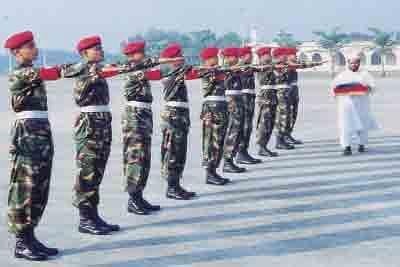Message from the foiled plot

THIS is no laughing matter. Even so, one may not quite resist the temptation of an Adlai Stevenson quote couched in humour: "A politician is a statesman who approaches every question with an open mouth."
But isn't silence golden when an investigation is on into a serious attempted incident of subversion brought to public light last Thursday? Of course, the next best will be restrained talking so as not to even unwittingly influence the course of investigation.
If the temper and nature of any issue should demand effective and focused handling then it must be the foiled coup plot. One may ask whether the timing has had anything to do with the attempt, is it linked to overall political ambience or how far of an outreach there was to it? These questions keep exercising the public mind.
The court of inquiry constituted by the Armed Forces on December 28, 2011, and complemented by the various intelligence agencies to unearth elaborate information about the plot and its proceedings is at work in full swing. A complete picture will only emerge after the inquisition reaches its conclusions and the salient findings are made public. Let's be patient.
It is in everybody's interest, more so that of the army and for sustenance of democracy that the perceived fault-line through which fanaticism tried to make an inroad into a disciplined force is sealed.
Bangladesh chapter of Hizb-ut-Tahrir, banned since October 22, 2010, is said to have circulated provocative leaflets based on fugitive Major Syed Ziaul Haq's internet message throughout the country. Hizb-ut-Tahrir is under the scanner and supposedly vestigial remnants of other extremist groups are likewise under surveillance.
Granted, the conspiratorial incident has been of such a nature that it could trigger a measure of political debate. It is understandable that each party will have party-line reactions. Should any political party, however, try to make a political capital out of it by even unwittingly dragging the army into any controversy, it would only be counter-productive. All stakeholders will only stand to lose.
The way our politicians are dealing with the plot and its aftermath leaves one feeling they need to put a leash on their tongue.
The ruling party Awami League (AL) has been quick at finger-pointing to the opposition Bangladesh Nationalist Party (BNP). AL accused BNP of having had a hand in the aborted conspiracy. Indian newspaper Anandabazar in a report hinted at Tareq Zia's possible role in the plot.
The prime minister has even quipped in a public meeting: "Now one could try and guess what Khaleda Zia had meant by prophesying this government's fall by December."
The BNP, while rejecting the accusations, has suggested that the government better keep from what it termed "playing a dangerous game by using the army as a political weapon." The party says in so many words that something of an old issue has been brought up to divert public attention from pressing issues at hand. But Begum Zia's allusion to alleged "disappearance" from the army, however, added fuel to speculation.
Most people think that unearthing of the plot rather than hushing it up has been a good thing. In a democracy that is how it should be, especially in matters concerning national security and stability of a constitutional government. Remember, despite some kind of a prescience, the then Bangladesh Rifles, or for that matter the home ministry, could not head off the heinous murder of army officers within Peelkhana complex.
Countering BNP's reactions Awami League General Secretary Syed Ashraful Islam maintained that the BNP in a consistent pattern of conspiratorial politics, ridden with killings and coups, have "tarnished" the image of the glorious Armed Forces. As if not to be left behind, Mirza Fakhrul Islam flatly said that BNP never came to power through conspiracy or military takeover. He even claimed that the Awami League had been associated with most army coup-d-etats. This is taking political tirade to a most mind-boggling level.
Compared with the transformational situations in Arab states, Pakistan, and to some extent, Myanmar, Bangladesh can regard itself as being politically better off. But beware of trouble-mongers who wait in the wings to fish in the muddy water and thus attempt to take that bit of shine off our sheen.
Unity and the integrity of the Armed Forces is a prized possession for any sovereign and independent country. So, political parties for their part will have to ensure that the army is kept free of any strains to realise its full potential as a professional and modern military force as they themselves maximise their internal vigil. They have matured and the process of their maturation needs to be bolstered.
The writer is Associate Editor, The Daily Star.
E-mail: [email protected]

 For all latest news, follow The Daily Star's Google News channel.
For all latest news, follow The Daily Star's Google News channel. 



Comments